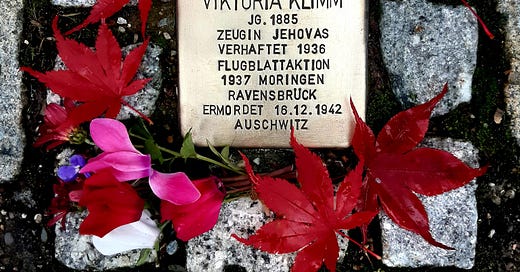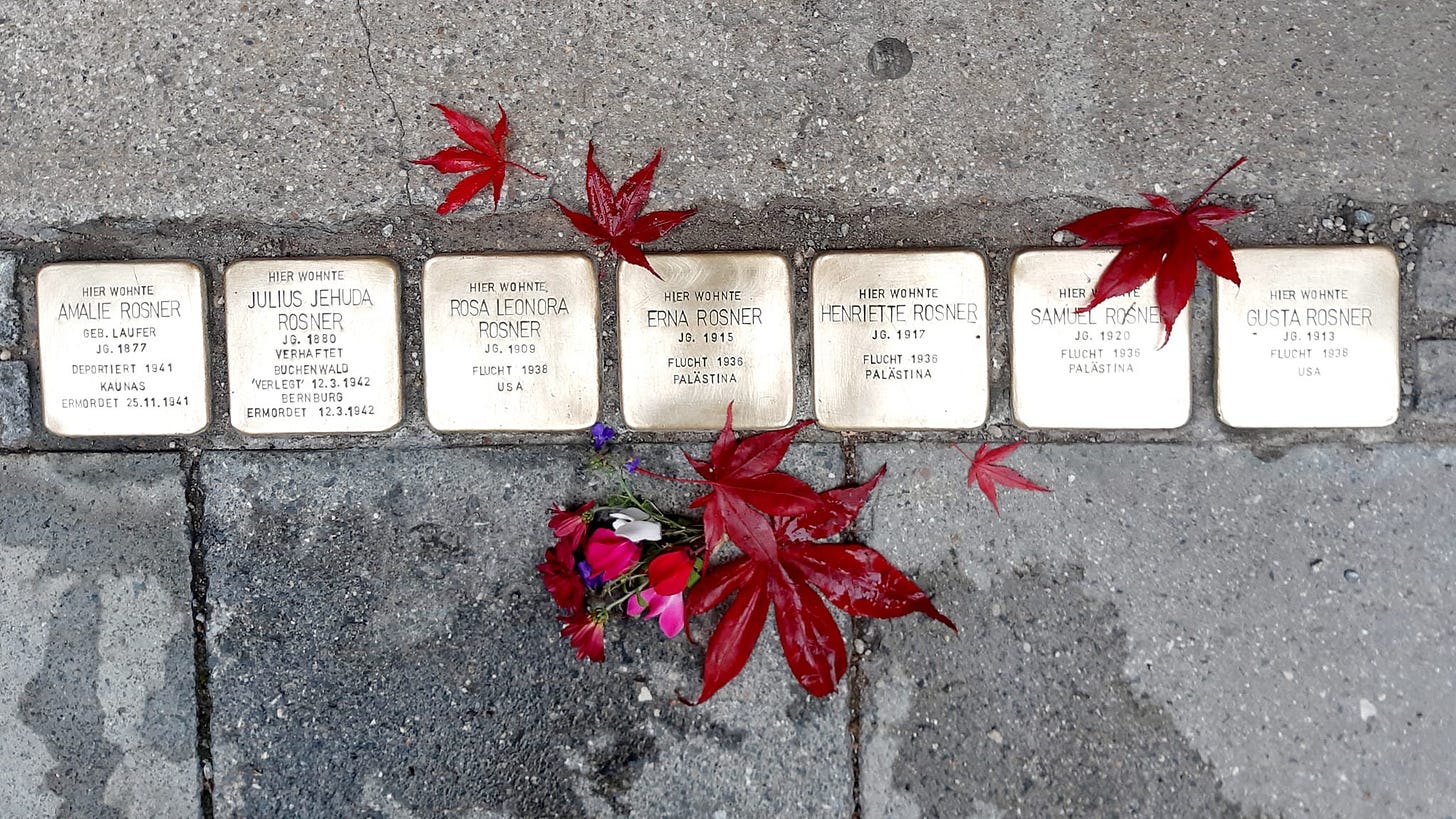Remembering
We remember Auschwitz for the sake of all victims everywhere who suffer. -- Elie Wiesel.
Remembering…
Yesterday was International Holocaust Remembrance Day in the United States, as well as in many countries around the world. People laid wreaths in front of solemn memorials. Others lit candles, or polished Stolpersteine. Where there were graves to be tended, visitation stones were placed on markers, or for non-Jewish victims of the Holocaust, flowers adorned gravesites.
Across the globe, Jewish congregations sang or chanted Mourner’s Kaddish, that uniquely Jewish prayer that at once expresses gratitude for life, longing for peace, and yet is recited to grieve our loss of loved ones. Gratitude, peace, and mourning, wrapped into a single chant. Perhaps the most moving example this year came from Mickey Levy’s chanting the prayer before the German parliament. Levy is President of the Israeli Knesset. But for that brief moment, everyone in the room shared his grief.
Remembering, however, is a tricky thing. Those closest to the loss remember with every fiber of their being. I am grateful that someone in Munich polished the stones for Viktoria Klimm — murdered in Auschwitz on December 16, 1942 for the crime of being Jehovah’s Witness — and the many stones for the Rosner family, murdered or deported for the crime of being Jewish. But my grief, and the grief of those who cleaned and polished the brass cobblestones, will never compare to the tears of the surviving Rosners, nor of Viktoria Klimm’s immediate family.
Remembering will become more difficult as generations pass. We remember the brutal Armenian genocide of 1915-1917. The Armenian community commemorates this devastation of their people on April 24 every year. And yet, all four hundred Armenians whose survivor testimonies were recorded between 1972 and 2005 have since died. All that remains of the horror the Armenian people knew between 1915-1917 endures solely on 16mm film, archived by the USC Shoah Foundation’s Visual History Archive. The grief, even anger, among contemporary Armenians may be real, but it is distant in comparison to what their grandparents and great-grandparents felt fifty years ago, much less 100 years past.
How shall we remember the irrational murder of millions that occurred during the Third Reich? The six million Jews, plus millions of Jehovah’s Witness, LGBTQ, Socialists, Communists, Polish nationals, physically or mentally handicapped, Roma, Sinti, dissidents, and prisoners of war - in another fifty years, the collective memory of lives senselessly cut short by a nation bent on hellish nationalism, scapegoated by politicians who wanted Germany to regain its imperial glory, will start to fade.
Jewish congregants will continue to say Kaddish. School children will continue to polish Stolpersteine. Perhaps a politician who is up for reelection will lay a wreath at Auschwitz or Dachau, or will travel to Israel to tour Yad Vashem.
But how will we remember? How will we come to terms with the enormity of the loss? And why should we remember, when the world has moved on? New hatreds, new mass murders, new or newly revived forms of racism and brutality, new contraventions of common law… Should we stop fighting injustice, even for one day, when the injustices around us are so great? Just to remember?
The words of Elie Wiesel point us in the right direction.
More than fifty years after Auschwitz, we remember Auschwitz not because we seek to arouse compassion or pity for ourselves; it is too late for that.
We remember Auschwitz for the sake of all victims everywhere who suffer. We remember our hunger so as to eliminate starvation today. We remember our anguish so as to proclaim the right of men and women everywhere to live without fear. We remember our death so as to denounce the insanity of violence and the absurdity of war, the ugliness of war, the shame of war.
We remember Auschwitz because we believe that, in spite of the past, the world is worthy of salvation; and salvation can be found in memory - in memory alone.
— Elie Wiesel, “In Memory,” The Jerusalem Post, April 23, 1996.
V’imru Amein, may it be so.
English translation of Mourner’s Kaddish:
Exalted and hallowed be God’s great name
in the world which God created, according to plan.
May God’s majesty be revealed in the days of our lifetime
and the life of all Israel — speedily, imminently,
To which we say: Amen.
Blessed be God’s great name to all eternity.
Blessed, praised, honored, exalted,
extolled, glorified, adored, and lauded
be the name of the Holy Blessed One,
beyond all earthly words and songs of blessing, praise, and comfort.
To which we say: Amen.
May there be abundant peace from heaven, and life, for us and all Israel.
To which we say: Amen.
May the One who creates harmony on high, bring peace to us and to all Israel.
To which we say: Amen.





